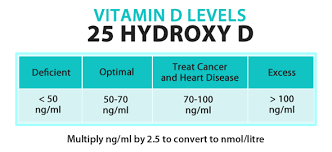What Are Sources of Vitamin D? What about Testing?
Vitamin D is present in only a few foods, such as cod-liver oil, oily fish (salmon, mackerel, sardines), and D-fortified dairy products and breakfast cereals.
Most of this vitamin in your body is manufactured in the skin after exposure to sunlight. People who don't receive adequate amounts of sun exposure are at risk of developing deficiency.
Free PCOS Newsletter
You're more likely to have an insufficiency if you live in northern latitudes or cloudy climates, stay mostly indoors, or are fully clothed or use sunscreen when outdoors. Or if you are a strict vegetarian.
According to one report, adequate vitamin D levels can be achieved by daily exposure of your hands, face, and arms to sunlight for one-quarter the time it would take to produce a light pinkness of the skin. If you're unable to obtain that minimal amount of sunlight exposure, vitamin supplementation should be considered.
How Much Should You Take?
First of all, the amount of D you should take depends on what type of you are taking. Vitamin D3 (the form of the vitamin produced in the human body after sunlight exposure) is at least 3.4 times as potent as vitamin D2, and may be as much as 9.4 times as potent. D2 is derived from fungal and plant sources.
If your doctor prescribes this vitamin, check to make sure it is D3 (cholecalciferol), not D2 (ergocalciferol). D3 much more effective and potent than D2.
Of course, you don't have to get a doctor's prescription for D3. It is available as a nutritional supplement. In fact, 600 IU of D3 is put into each capsule of the "d-pinitol formula". This formula was designed by a MD and a registered pharmacist to help women with PCOS issues. So if you want to get a modest amount of D3, this product is a good place to start.
The recommended daily allowance for adults is 600 IU per day. But frankly, you probably need a lot more than that. I myself take 5,000 IU per day as a maintenance dose to keep me in the optimal range.
Some say a reasonable dosage range for D3 supplementation is 800 to 1,200 IU per day. According to the Food and Nutrition Board of the National Research Council, long-term D intake up to 2,000 IU per day is unlikely to have any adverse effects among the general population.
However, you may need much more than this amount if you have a deficiency.
Get a Vitamin D Test

If you want to break the back of PCOS, a vitamin D test is a great place to start. It's simple and easy. If you have polycystic ovary syndrome or diabetic tendencies or are overweight, you should definitely get this test from your doctor.
If you're low, take enough supplemental D so that your lab value ends up in the optimal range.
The test will measure levels of 25-hydroxy vitamin D, or 25(OH)D. The test results will be expressed in nanograms per milliliter (ng/mL). Researchers are beginning to think the optimal levels of this vitamin are in the range of 50-70 ng/mL. If your level is around 30 or lower, you are thought to have a deficiency. Personally, we think any value below 50 warrants some supplementation.
You can increase your D levels by exposing your skin to more sunlight. However, studies have shown that sun exposure alone is not sufficient to raise your D levels to the optimal level if you are deficient. Therefore, some level of supplemental D3 is generally suggested.
In extremely high doses for a sustained length of time, D can become toxic. Before taking unusually large amounts of D, consult with a doctor and get a blood test to measure your D level before you start therapy.
Even if you don't get a test, you should especially consider supplementation if you live in northern latitudes or cloudy climates, stay mostly indoors, or are fully clothed or use sunscreen when outdoors, or are a strict vegetarian.
Related Articles
Source:
Heaney RP et al. Vitamin D3 Is More Potent Than Vitamin D2 in Humans. JECM, 2011, 96 (3): E447
Get Answers to your Questions about
- Fertility
- Weight Control
- Hair Loss
- Stress
- Unwanted Hair
- Acne...and more!
FREE PCOS Report
and Newsletter

Your email is safe with us. We respect your privacy, and you may unsubscribe at any time.
Recent Articles
-
PCOS Long Journey to The Happy End
Apr 30, 18 07:24 PM
Hi Girls, Maybe my story will have one day a good end but I am not there yet. Until I was 31 years old I lived my dream, having lovely husband, good -
PCOS and Miscarriage
Apr 17, 18 04:03 PM
Proper diet and natural supplements can help the body maintain a pregnancy through successful delivery.
-
How to Deal with PCOS and Stress
Apr 04, 18 04:19 PM
Your body has a natural capacity to heal itself if you provide it with the necessary tools.





